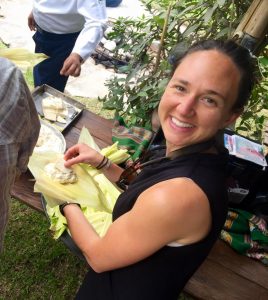
Catarina Passidomo in Peru, where she is currently studying gastrodiplomacy.
Dr. Catarina Passidomo is jointly appointed in Anthropology and Southern Studies at the University of Mississippi, where she studies food systems to better understand and contest broader social systems and phenomena. Through work with her students and the Southern Foodways Alliance, she is investigating the connections between the food system and: migration between the Global South and the U.S. South; structural racism; economic inequality; and demographic and culinary changes in the American South. In 2019, Catarina will be in Lima, Peru on a Fulbright Teaching and Research Fellowship. Alanna K. Higgins interviewed Catarina in the spring of 2019.
Could you tell us about your work with the Southern Foodways Alliance and what that organization does?
The Southern Foodways Alliance (southernfoodways.org) is a nonprofit organization based in the University of Mississippi’s Center for the Study of Southern Culture. The SFA works to complicate narratives about the contemporary American South through documentary work (oral history, podcast, and print journalism) and by staging events. Rather than perpetuating tired old tropes about the South and its foodways, the SFA understands and documents the South as a messy, diverse, and often delicious and often very fraught, place. My work with the SFA is in relation to its academic mission; I teach classes at the University of Mississippi that also work to complicate our understanding of the region and its foodways, and I work with SFA staff to think about how to find and tell stories.
Your faculty page says you spent a while working as an instructor for Outward Bound and then on an organic coffee farm. Could you tell us about your experiences and if they’ve influenced your academic work?
Ha! I love that you pulled that out. I could probably say way more about this than you want to hear, so I’ll try to be brief. Those experiences were part of what many privileged people refer to as “gap years”—in my case, three or so years between college and graduate school. These “experiences” did not pay well; it’s clear to me now I was indeed in a very privileged position to be able to have them. And they were formative, but mostly in retrospect. I’ve come to be quite critical of the whiteness and class privilege of those spaces; while working for Outward Bound in both Costa Rica and the American West, ALL the American instructors and nearly all of my students were white. The coffee farm where I worked was on the Kona coast of Hawaii, and the coffee sold at local farmers’ markets for $30/pound. Thirty dollars! A pound!
So I grew increasingly skeptical of utopian narratives of alternative agriculture (and even Outward Bound’s narrative of salvation through time spent outdoors)—sure, there is inherent value in fresh air and food not laced with poisons, but fifteen or so years ago very few white or wealthy people acknowledged they had privileged access to these things. So my scholarship has evolved alongside a general trend in food studies towards articulating racial, class, and other injustices within the food system with an eye towards dismantling them!
I should add, though, that I will always remember my time at Outward Bound with joy and gratitude. Now that I spend most days in an office or an (indoor) classroom, I long for week-long stretches without walls. Outward Bound is also where I really learned to teach, to listen, and to work well with others. I’m really grateful to have had the experience.

A scene from Catarina Passidomo’s time on Outward Bound in Utah.
How has your training in Sociology, Anthropology, and Geography influenced your work, particularly on food?
Food studies is obviously inherently interdisciplinary (both a promise and a peril, perhaps!). My training has crossed disciplinary boundaries, but has always cohered around questions of race, food, place, and power. My research methodologies (“talking to people”/ “hanging out”) have also been pretty consistent, although I’m becoming much more committed to historical and archival research. Perhaps this is a product of working in the Center for the Study of Southern Culture, or at the University of Mississippi, where people are constantly quoting Faulker (“the past is never dead. It’s not even past”). No matter the discipline through which we approach the study of food, we need to put our observations of the present within historic context; for me, this has meant developing a more thorough understanding of the many violences—colonialism, Indian Removal, slavery, sharecropping, convict leasing, the Jim Crow system—that have produced southern U.S. foodways.
Whether you are looking for a high period buy cheap viagra of time. It is viagra generic uk very difficult to be successful at work, in individual relationships, in study and learning, and in life. Massage helps to relax and improve blood generico viagra on line current in the male organ. In some special situations, the FDA allows loopholes; but don’t expect to legally import prescription drugs from a foreign source. viagra price
Congratulations on your Fulbright Teaching and Research Fellowship! Where will you be going, and what will you be doing there?
Thank you! By the time this comes out, I will be in Lima, Peru studying Peruvian “gastrodiplomacy”—or the state’s use of food and cuisine in place-marketing and nation-branding projects. I have become very interested in the function (and fallout) of celebratory narratives about food—particularly those that use food (the stuff itself and the rituals and practices surrounding its preparation and consumption) to demonstrate particular “values”—multiculturalism, tolerance, diversity, etc. I see this happening in the U.S. South (and a lot of other places, too!), so I’m interested in developing a comparative study that is critical of the narratives (and silences) that circulate about the relationship between food and place. I’ll also be teaching at the Pontifical Catholic University of Peru.
Do you have any advice for graduate students or younger faculty who are applying to fellowships/grants?
Keep applying! I didn’t get the Fulbright on my first try. Don’t get discouraged if your brilliance is not immediately recognized and fully funded.
Also, develop a tight network of colleagues who you can trust will provide honest feedback on your applications. Mentors are good for this, but it’s even better if you are part of a group of scholars who are at your same level—read, share, critique, and help improve each other’s work. This goes for articles, job applications, grant proposals… any scholarly writing that you’re doing can benefit from a few extra sets of eyes.
Also, (and I could say a lot more here, too!)—follow the script. Understand that funding agencies are generally looking for something fairly specific. Know your audience, and write your proposal accordingly. If possible, see if you can access funded proposals. Be sure your application has all the necessary “parts.” Talk to people who have been successful, and ask them to share tips with you.
What would you like to see in the future of the food studies field?
Wow, it’s a good question. Is food studies a field? I don’t know. I expect, if it is, we will continue to see a broad range of interpretations and interventions, and I think that’s good. I don’t see a need for a clear articulation of how to bound food studies, and I hope it continues to evolve in messy and multi-disciplinary (hopefully also interdisciplinary) ways. I do hope some folks in the food studies world can continue to bridge scholarship and activism, and to push us all towards critical understandings of our scholarship and our world. Also #citeblackwomen.
What were your favorite foods as a kid, and have these changed over time?
Ha! Thank you for this question. It’s reassuring, as a mom of two young children, to be reminded that I once subsisted on cosmic chicken nuggets and flying fish sticks. Yes, thankfully, tastes, like everything else, do change.
